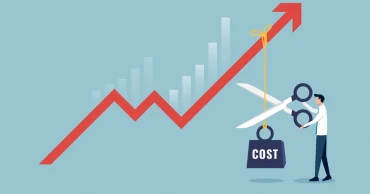government spending
Finance Ministry stresses the importance of balancing recurrent and capital expenditure
The Finance Ministry has highlighted the crucial need for a balanced approach to budgetary allocations between recurrent and capital expenditure, recognizing their collective impact on the country's growth prospects and social welfare. This perspective is outlined in the ministry's document, the 'Medium Term Macroeconomic Policy Statement (2023-24 to 2025-26)', which underscores the different priorities of developed and developing nations in terms of government spending.
Developed countries often prioritize transfers and subsidies, whereas developing economies are more inclined towards investing in social and community services. Despite the positive outcomes from income transfers in enhancing citizens' lives, there is a pressing need to ramp up capital expenditure to cater to the increasing public investment demands and foster the creation of productive assets.
Budgetary classifications broadly categorize government spending into recurrent and capital expenditures. Recurrent expenditure encompasses wages, goods and services purchases, subsidies, transfer payments, and interest on loans. In contrast, capital expenditure is directed towards building and enhancing productive assets, including developments under the Annual Development Program (ADP) and non-ADP initiatives.
Sikder Group responds to allegations following ACC case against directors
The trend in capital expenditure, representing a portion of the total expenditure, has seen an upward trajectory, albeit with fluctuations, while recurrent expenditure has shown a gradual decrease. The revised budget for the fiscal year 2022-23 allocated 59.1 percent to recurrent expenditures, with projections indicating a slight reduction over the next three years. Meanwhile, capital expenditure is set to rise from 40.9 percent in the 2022-23 fiscal year to 41.3 percent by 2026, reflecting an ongoing commitment to bolstering public investment.
The increase in recurrent expenditure from 56.7 percent in FY 2017-18 to 59.4 percent in FY 2021-22 was influenced by various stimulus packages introduced to support vulnerable groups during the combined challenges of the COVID pandemic and the Russia-Ukraine conflict. Conversely, capital expenditure through the ADP, a critical component of the budget, has experienced modest growth from 4.5 percent of GDP in FY18 to an estimated 5.1 percent of GDP in FY 2022-23.
This strategic focus on balancing recurrent and capital expenditures aligns with the government's objectives to drive sustainable economic growth while ensuring the welfare of its citizens through prudent fiscal management.
Eid holiday: Trade activities through Benapole port to be suspended for 5 days
1 year ago
Austerity the new buzzword as govt lowers expenditure estimates
The government of Bangladesh has been compelled to pull down its projections for expenditure in the coming couple of years – in light of the changed economic reality brought about mainly by the Russia-Ukraine war and its aftermath of sanctions and counter-sanctions.
In its projections for the 2021-22 budget, the government had projected its total expenditure at 17 percent of GDP for the next two fiscals, i.e. 2022-23 and 2023-24.
However, in preparing the budget for 2022-23, the government has estimated expenditure at 15.2 percent of GDP for the 2022-23 fiscal, while it will be 15.5 percent for the 2023-24 fiscal.
By 2024-25, as per a budget document, the target for expenditure has been set at 15.6 percent of GDP.
Read more: Austerity is on but people will get electricity: PM
The government in the last fiscal, 2021-22, had set the expenditure target at 17.5 percent, but it was revised to 14.9 percent.
This is part of the government’s austerity drive in terms of expenditure, given all the forecasts that the world is heading towards an economic recession in 2023.
According to the document, government expenditure was 13 percent of GDP in 2020-21 fiscal.
As per the document, with successful implementation of reforms in Public Financial Management, government expenditure kept increasing since the 2015-16 fiscal.
Read more: PM reiterates call to practice austerity in all spheres of life
It also mentioned that the Annual Development Programme (ADP) was 4.5 percent of the GDP in the 2020-21 fiscal.
In the current fiscal, the government plans to allocate 5.5 percent of the GDP for the ADP while it is 6.3 percent for 2022-23 and 6.4 percent for 2024-25.
The document is revealing in how large the Russia-Ukraine conflict looms in the government’s calculations, and the challenges posed in its wake.
The “unprecedented” price hike in the international energy market, food supplies and other essential commodities alongside the widespread disruption in international supply chains have adversely affected the global economy, including Bangladesh.
Read More: Govt focuses on less current expenditure and increased capital spending: official document
The conflict is likely to emerge as a new obstacle in the way of achieving development targets, as well as full recovery from the COVID-19 crisis.
The prices of essential import commodities for Bangladesh like oil, gas, fertiliser, edible oil, etc. have skyrocketed in the international market.
According to Finance Division estimate, only nine essential commodities (crude and refined oil, LNG, wheat, fertiliser, palm oil, coal, soybean oil, maize and rice) imported to Bangladesh will cost an additional USD 8.2 billion in 2022, considering the rise in their prices over that in 2021.
The other key import items like consumer goods, capital machineries and industrial raw materials have also seen significant price escalations in the international market. In addition, the costs of international logistics are on the rise. Import-induced inflation, therefore, is gradually emerging as a major concern for Bangladesh Government.
Read More: Govt spending on public servants is to rise next fiscal
3 years ago
President urges transparency and accountability in government spending
President M Abdul Hamid on Sunday asked the authorities concerned to ensure transparency in government expenditures for the sake of public interest.
The president made the call when Auditor General and Comptroller Muslim Chowudhury presented the annual audit to him at Bangabhaban in the evening.
During the meeting, the CAG briefed the president on various aspects of the report.
"Audit is very important to ensure transparency and accountability in government expenditures,"President Hamid said.
Also read: President urges PSC to accelerate recruitment for govt posts
The president also directed the CAG to intensify the audit activities to settle the unresolved audit objections on time.
Later, a delegation led by the Chairman of the Bangladesh Accreditation Council Prof. Dr. Mezbah Uddin Ahmed presented the first annual report of the Council to President Hamid.
The chairman of the Accreditation Council briefed the president on various aspects of the report and its overall functions.
Hamid directed the Accreditation Council to play its role in ensuring transparency and accountability in the overall activities including education and research in the universities.
The president also suggested bringing the activities of the university under monitoring to ensure the quality of higher education.
Also read: President Hamid receives 10 names for EC proposed by search committee
Secretary to the President's Office Sampad Barua, Military Secretary Major General SM Salah Uddin Islam, and Press Secretary Joynal Abedin were present on the occasion.
3 years ago


.jpg)

